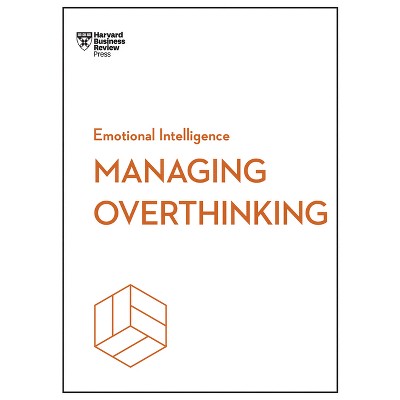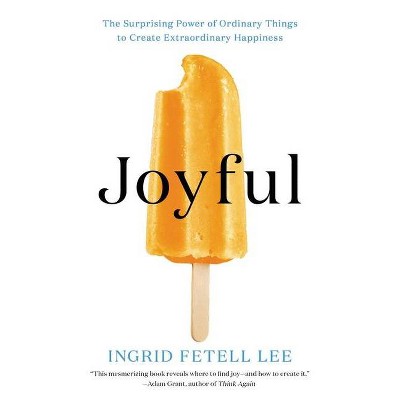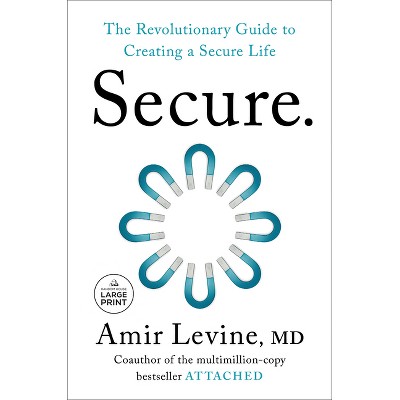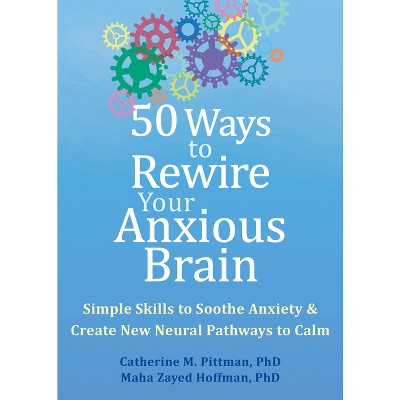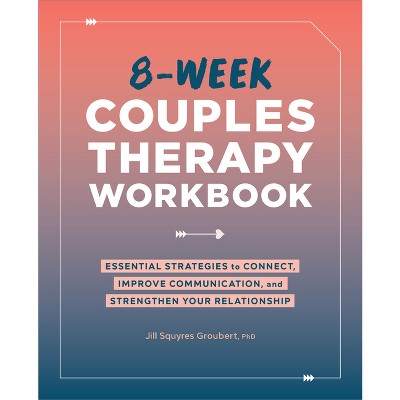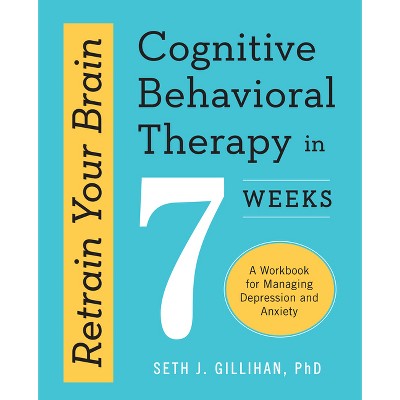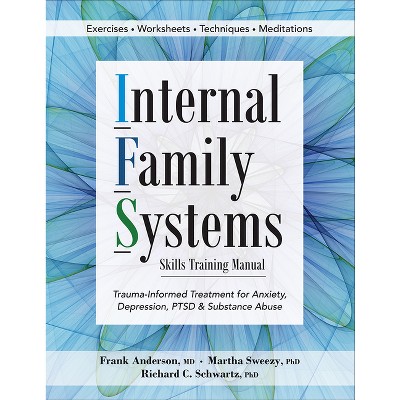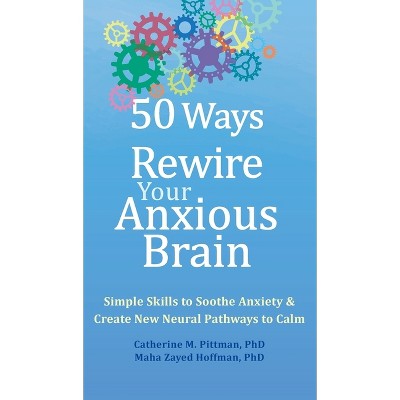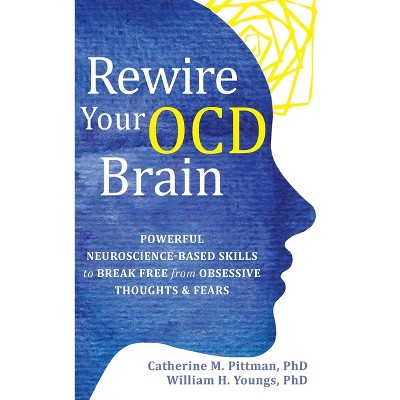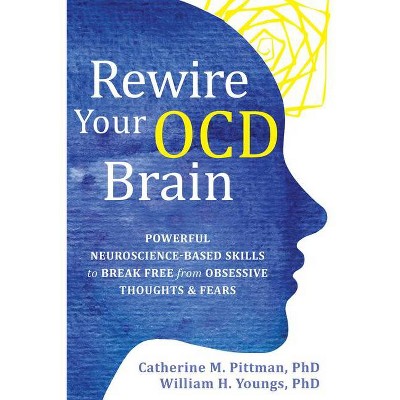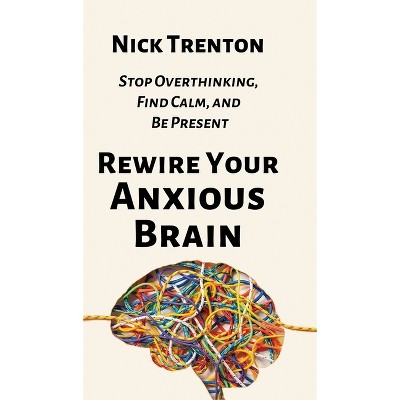Sponsored

Rewire Your Anxious Brain - 2nd Edition by Catherine M Pittman & Elizabeth M Karle (Paperback)
Pre-order
Sponsored
About this item
Highlights
- Do you ever wonder what is happening inside your brain when you feel anxious, panicked, and worried?
- About the Author: Catherine M. Pittman, PhD, is a professor at Saint Mary's College in Notre Dame, IN.
- 240 Pages
- Self Improvement, Anxieties & Phobias
Description
About the Book
Now fully revised and updated, Rewire Your Anxious Brain offers a unique, evidence-based solution to overcoming anxiety based in cutting-edge neuroscience and research. In the book, readers will learn how the amygdala and cortex--both important parts of the brain--are essential players in the neuropsychology of anxiety. Using the practical self-assessments and proven-effective techniques in the book, readers will learn to "rewire" the brain processes that lie at the root of their fears.Book Synopsis
Do you ever wonder what is happening inside your brain when you feel anxious, panicked, and worried? Now fully revised and updated, Rewire Your Anxious Brain offers a unique, evidence-based solution to overcoming anxiety based in cutting-edge neuroscience.
In Rewire Your Anxious Brain, psychologist Catherine Pittman and author Elizabeth Karle show how the amygdala and cortex (both key parts of the brain) are essential players in the neuropsychology of anxiety. The amygdala acts as a primal response, and oftentimes, when this part of the brain processes fear, you may not even understand why you are afraid. By comparison, the cortex is the center of "worry." That is, obsessing, ruminating, and dwelling on things that may or may not happen.
In the book, Pittman and Karle provide specific examples of how to manage fear by tapping into both of these pathways in the brain. You'll gain a greater understanding of how anxiety is created in the brain, and as a result, you will feel empowered and motivated to overcome it. This new edition also features the latest in cutting-edge brain research, unique "goal-focused" self-assessments, and more than a decade of new findings in neuroscience.
The brain is a powerful tool, and the more you work to change the way you respond to fear, the more resilient you will become. Using the practical and proven-effective techniques in this book, you will learn to literally "rewire" the brain processes that lie at the root of your fears.
Review Quotes
"Building on the trusted guidance of its first edition, this highly readable new edition delivers exactly what readers need: practical wisdom, heartfelt encouragement, and evidence-based tools to navigate anxious thoughts and feelings. With clarity and compassion, the authors expand on proven techniques while offering new insights tailored for today's unique challenges. Highly recommended for anyone seeking tangible, lasting relief from anxiety and a renewed sense of hope."
--Reid Wilson, PhD, author of Stopping the Noise in Your Head
"In a timely update of their widely acclaimed self-help book, the authors incorporate recent research about the neurological foundations of anxiety and brain neuroplasticity. They show, in highly accessible language, how even just imagining danger can activate fear circuitry. Understanding, experiencing, and thinking differently can change the brain, making it easier to resist avoidance. There are guidelines to calm the body and mind so you can pursue what matters."
--Sally Winston, PsyD, executive director of the Anxiety and Stress Disorders Institute of Maryland; and coauthor of Overcoming Unwanted Intrusive Thoughts, Needing to Know for Sure, and Overcoming Anticipatory Anxiety
"In a world in which the chemical imbalance theory still dominates and medication is often seen as the only solution, Rewire Your Anxious Brain is a breath of fresh air. The authors offer a refreshing, science-backed perspective on anxiety, with a powerful focus on the role of the amygdala. Even more valuable--they provide practical, nonpharmaceutical tools for lasting change. This book is a must-read for both mental health professionals and anxious souls alike."
--Tara Bixby, LPC, host of the tara bixby podcast
"Pittman and Karle provide an expanded explanation of the neurobiological interactions and responses among thoughts, feelings, and emotions relative to the etiology of anxiety. Nice balance between explaining functional neurology and providing self-assessment tools to better understand how to manage anxiety. They offer in-depth strategies to strengthen coping skills to live more independently from anxiety. Highly recommend this book for therapists and anyone who suffers from anxiety."
--Susan Myers, RN, LCSW, BCD, former holistic therapist with the VA Health Care System
"This book is an invaluable resource for helping clients understand what's happening in their brain when they are experiencing anxiety. The clear explanation of roles of the cortex and amygdala in creating anxiety boosts engagement and empowers clients to apply the practical tools offered. This book has been transformative in my clinical work and has helped my clients change their relationship with anxiety, and reclaim a sense of calm and control over their thoughts."
--Rachel Hiraldo, LPCC, CCATP, founder and lead counselor at Vivify Counseling and Wellness
About the Author
Catherine M. Pittman, PhD, is a professor at Saint Mary's College in Notre Dame, IN. As a licensed clinical psychologist in private practice in South Bend, IN, she specializes in the treatment of brain injuries and anxiety disorders. She is a member of the Anxiety and Depression Association of America (ADAA), and provides workshops and seminars on the topics of anxiety and stress.
Elizabeth M. Karle, MLIS, is circulation and fulfillment manager at the Cushwa-Leighton Library at Saint Mary's College in Notre Dame, IN. In addition to supplying research for this book, she has personal experience with anxiety disorders--providing a firsthand perspective that focuses the book on what is most useful for the anxiety sufferer. Originally from Illinois, she currently resides in South Bend, IN; and holds degrees or certificates from the University of Notre Dame, Roosevelt University, and Dominican University. She is author of Hosting a Library Mystery.
Shipping details
Return details
Frequently bought together

